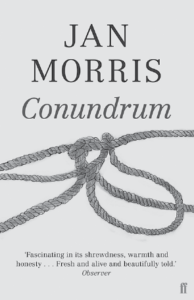By Jan Morris
New York Review of Books, 2002
At a time when transgender youth are being threatened with parental separation [1] and transgender women and transfeminine people of color are being murdered at record rates [2], Conundrum is especially poignant.
Originally published in 1974, this slim but substantial memoir follows the life and gender transition of acclaimed travel writer Jan Morris. This 2002 edition includes a new introduction as well as some factual edits. Otherwise, it’s unchanged, making it a sort of time capsule of the lived experience of a transsexual [3] woman undergoing transition in the 1960s.
Jan Morris was born in 1926 in Wales. Although she knew herself to be female by the age of four, Morris kept this knowledge to herself as she grew up, praying by night to God to make her a girl, and by day braving the masculine rigors of the English school system. [Note: The editor had added Morris’s birthname to the first sentence in this paragraph, without authorization from the review’s author. The sentence now reads as the author intended.]
Morris entered the Army at 17 and marveled at the privilege of observing the secrets of a closed male society. While she made friends easily, she knew she didn’t fit in. When at last Morris discovered a trans biography in a bookstore, she had confirmation that she wasn’t alone in her condition.
After exiting the Army, Morris was determined to explore her identity and the world around her. She found an exciting job as a journalist, working for the Arab News Agency in Cairo, The Times of London, and the Manchester Guardian.
After a decade as a foreign correspondent during the 1950s, she branched out and wrote over fifty books about travel, historical-cultural studies of cities and countries, as well as biographies and novels.
Her yearning for children led her to marriage to a woman that she loved dearly, though she chafed at the masculine role. But though her career and home life were satisfying, her dysphoria grew to such an extent that she decided had no choice but to medically transition.
Morris spent the early 1960s seeking out psychiatrists and sexologists, most of whom were charlatans, to pursue medical transition. Although she eventually gained access to estrogen tablets, she flushed them, preferring to wait until she and her wife were done having children.
When at last her children were grown, Morris began the long journey of transitioning, starting with hormone replacement therapy and ending with a risky surgery in Morocco. It was there in 1974, during her recovery, that she met others like her for the first time. Transition saved her from suicide; in meeting other trans people she realized that they too had been saved.
Conundrum was a fascinating and important book for me to read, but it was also difficult and occasionally painful. While Morris is an exceptional writer—her prose is beautifully descriptive and intellectual yet approachable—some of her ideas and opinions were troubling to me.
When writing about other trans women, for example, she frequently refers to them by their deadnames and incorrect pronouns. She also expresses racist opinions about indigenous and African/African diaspora folks. Finally, Morris has a great many ideas about gender roles that from a more informed perspective are quite sexist.
Despite the occasionally problematic ideas expressed within, I believe that Conundrum is a worthwhile read for anyone curious about mid-20th-century gender identity and transition. I would recommend pairing it with Leslie Feinberg’s Transgender Warriors [4] for a deeper dive into historical trans identities and histories through a Marxist lens.
Charlie McNabb is a social scientist and librarian who studies transgender identities and histories. They are the author of Nonbinary Gender Identities and Queer Adolescence. Charlie also enjoys Bigfoot and birdwatching.
Notes
- Dey, Sneha, and Karen Brooks Harper. “Transgender Texas kids are terrified after governor orders that parents be investigated for child abuse.” The Texas Tribune, February 28, 2022. http://www.texastribune.org/2022/02/28/texas-transgender-child-abuse.
- Transrespect Versus Transphobia Worldwide. “TVT TMM Update, Trans Day of Remembrance 2021.” November 11, 2021. http://transrespect.org/en/tmm-update-tdor-2021.
- Although many trans folks prefer to be referred to as “transgender,” some (including Morris) use the older term “transsexual.”
- Feinberg, Leslie. Transgender Warriors: Making History from Joan of Arc to Dennis Rodman. Boston: Beacon Press, 1996.

Be First to Comment